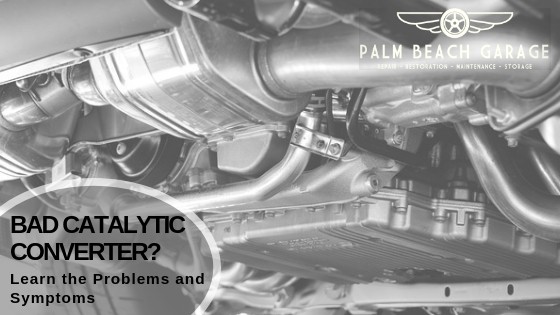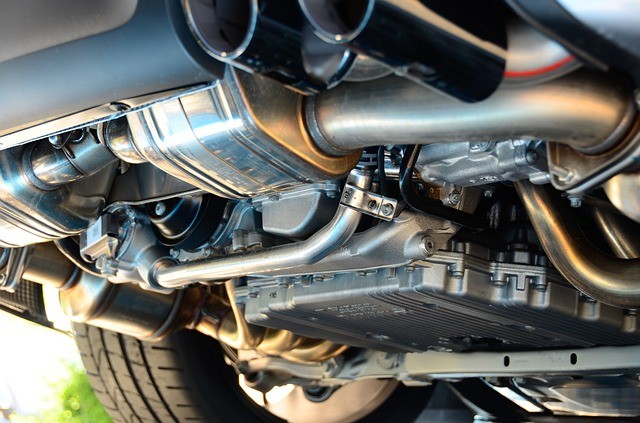
Driving with a bad catalytic converter isn’t always obvious. Watch out for these signs so catalytic converter symptoms don’t go undiagnosed and cost you a fortune in repairs.
Think your vehicle has a bad catalytic converter?
Since the signs of one failing aren’t as obvious as your engine overheating or a flat tire, you could be driving with a bad catalytic converter and making the problem much worse.
What Does a Catalytic Converter Do?
A catalytic converter sits between your engine and the muffler in your exhaust. Its main job is to reduce emissions from your car to protect the environment.
This metal canister is filled with a chemical catalyst which “converts” gas emissions in your exhaust system so they’re either decreased or eliminated.
A bad catalytic converter will give off higher emissions than allowed by the state.
So a car with a malfunctioning catalytic converter will not pass a vehicle inspection. And that means you won’t be able to drive your vehicle legally.
Driving with a Bad Catalytic Converter (and other Bad Catalytic Converter Symptoms)
The EPA’s Federal Emissions Warranty says catalytic converters must be covered for eight years or 80,000 miles, whichever comes first.
Catalytic converters generally don’t malfunction unless another connected part, like a spark plug or an exhaust valve, fails and is then ignored. But they can wear out and become compromised over time too.
Failing an emissions test is just one sign your catalytic converter has gone bad.
See if you spot any of the other red flags:

Your Check Engine Light is On
Though an illuminated Check Engine Light could mean many issues you’ll want a professional mechanic to diagnose, one of them may be a bad catalytic converter.
Newer engines have oxygen and air/fuel ratio sensors to measure the efficiency of the catalytic converter’s pollution fighting. By monitoring the levels of gas in the exhaust, your car’s computer will know when it’s not working correctly and alert you.
A Rattling Noise In the Engine
If you’re using a super rich fuel mixture, the chances of the catalyst-coated honeycomb-shaped mesh on the inside of your converter becoming damaged and worn out is higher.
When this happens, the pieces break apart and rattle around inside. You’ll notice this especially when you first start your car.
Don’t ignore these rattles as they only get worse.
You’re Getting Fewer Miles Per Gallon
Feel like you’re filling up the tank more often? A bad catalytic converter often means poor fuel efficiency.
Depending on how big your tank is, you could be wasting a lot of money unknowingly — and furthering the buildup in your catalytic converter if it’s already clogged.
Your Car Jerks Forward, Loses Fuel During Acceleration, Or Stalls Out
When you have a clogged catalytic converter, your engine will have a hard time managing the buildup of pressure.
With the catalytic converter essentially “choked” on a buildup of particles, it will be difficult for your engine to “breathe.”
You’ll notice a loss in power and acceleration, jerky movements, and complete stall outs if exhaust flow is severely restricted.
Engine Misfires
An engine misfire is when one or more of your engine’s cylinders stop providing power to your car. When this happens, raw fuel may enter the catalytic converter. It can also overheat and melt itself, or cause an engine fire.
So what should you do to prevent this destruction?
What to Do About a Clogged Catalytic Converter and Damaged Catalytic Converter Repair
Replacing a bad catalytic converter is the third most common car repair related to a check engine warning light, according to CarMD[*].
Installing a new catalytic converter usually takes about one hour. Fixes for older catalytic converters tend to be simpler than modern versions, but replacing one may be more expensive depending on your car’s rarity.
Now that you know a few bad catalytic converter symptoms, schedule a checkup with your mechanic today.
A catalytic converter going bad won’t just prevent you from being street legal, it can cause poor performance, a higher fuel bill, and potential internal damage.
As a complete auto repair and service center, The Palm Beach Garage offers this essential service and more. Just call 561-223-3984 to speak with one of our experts now.